Yeovil Trades & Traders
Hyde & Wakely
Sewing Machines and Cycle Dealers
Joseph Hyde
Joseph Hyde was born in Yeovil in 1866 and baptised at St John's church on 30 September 1866. He was the youngest of the six children of stonemason Francis Hyde (1825-1877) and Mary Ann née Mead (b1829) of Kingston. Francis and Mary's children, all born in Yeovil, were; Francis J (b1851), Melina (b1853), Bessie (b1857), Edwin (b1861), Harriett (b1864) and Joseph.
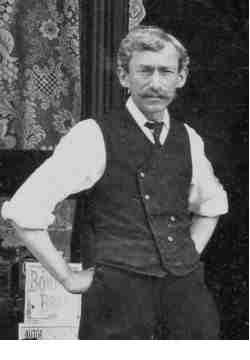 In
the 1871 census,
the family were
listed living in
Kingston, in a
cottage next
door to the
Duke of York.
Francis gave his
occupation as a
stone mason and
pavier.
Four-year-old
Joseph was
listed as a
scholar.
In
the 1871 census,
the family were
listed living in
Kingston, in a
cottage next
door to the
Duke of York.
Francis gave his
occupation as a
stone mason and
pavier.
Four-year-old
Joseph was
listed as a
scholar.
At the age of 55, Francis died in Yeovil and in the 1881 census, his widow Mary had moved the family to 85 Huish. She was listed as a 48-year-old widow, working as a glover. Living with her were Melina, Edwin and 14-year-old Joseph, working as a factory hand in a glove factory. Joseph clearly didn't work in the gloving industry for long, since he was apprenticed to bicycle and sewing machine dealer James Moffatt of High Street.
In the 1891 census, Joseph and his mother were living with Joseph's sister Melina, her husband railway telegraph linesman John Holley and their two children at 86 Sherborne Road. 25-year-old Joseph gave his occupation as a sewing machine fitter.
In 1900, 34-year-old sewing machine repairer Joseph had entered a partnership with 23-year-old cycle engineer Fred Wakely. Joseph was listed living with the Wakely family at 17 Vicarage Street. Joseph concentrated on sewing machines, especially those used in the glove trade, while Fred dealt with the bicycle side of the business.
In the autumn of 1903, in the Chard Registration District but almost certainly at St Bartholomew's church at Crewkerne, Joseph married a (second?) cousin Emily Maria Hyde (1873-1919), of Crewkerne the daughter of George Hyde (1838-1921) and Jane née Courtenay (1840-1920). Joseph and Emily were to have three children, all born in Yeovil; Gladys Courtney (1904-1946), Sidney Frances (b1909) and Norman (b1911).
In the 1911 census, Joseph, Emily and their three children, together with a servant, were listed living at 17 Vicarage Street. 44-year-old Joseph gave his occupation as 'Sewing Machine Engineer & Cycle Agent'.
Emily died in Yeovil during the winter of 1919, aged 46, and Joseph died in the spring of 1954, also in Yeovil. He was aged 87.
Frederick Thomas Wakely
Frederick Thomas Wakely, known as Fred, was born in Yeovil in 1878 and baptised on 12 June 1878 at Holy Trinity. He was son of butcher Thomas Wakely (b1846, Symondsbury, Dorset) and Eliza née Frampton (b1852, Symondsbury, Dorset). Thomas and Eliza initially settled in their home town of Symondsbury, where their first three children were born; Alfred (b1873), Mary (b1874) and Florence (b1875). They then moved to Yeovil where William was born in 1877, followed by Fred. The 1881 census recorded the family living in Victoria Buildings.
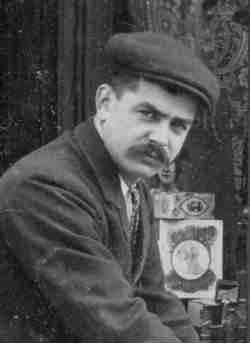 By
the time of the
1891 census the
family, now
enlarged with
Wilfred (b1881)
and Charles
(b1883), were
living at 7
Queen Street.
13-year-old Fred
gave his
occupation as a
grocer's
assistant. In
the 1901 census,
now living with
his family at 17
Vicarage Street,
23-year-old Fred
gave his
occupation as a
cycle engineer.
His father,
54-year-old
Thomas Wakely,
was now working
as a chandler's
labourer and it
is likely,
therefore, that
the premises
were those of
Hyde and Wakely.
By
the time of the
1891 census the
family, now
enlarged with
Wilfred (b1881)
and Charles
(b1883), were
living at 7
Queen Street.
13-year-old Fred
gave his
occupation as a
grocer's
assistant. In
the 1901 census,
now living with
his family at 17
Vicarage Street,
23-year-old Fred
gave his
occupation as a
cycle engineer.
His father,
54-year-old
Thomas Wakely,
was now working
as a chandler's
labourer and it
is likely,
therefore, that
the premises
were those of
Hyde and Wakely.
On 25 December 1902, at St John's church, Fred married Brenda Eliza Robbins (b1879), the daughter of smith and wheelwright Louis Robbins (b1859) of Odcombe, and Emily née Galpin (b1855). Fred and Brenda were to have two children, both born in Yeovil; Doris Freda (b1904) and Eric Thomas (b1907). In the b1911 census, Fred, Brenda and their two children were listed at 11 King Street. Fred gave his occupation as a cycle engineer. Fred died in Yeovil during the spring of 1954. He was 75 years old.
Hyde & Wakely
As stated above, in 1900 sewing machine repairer Joseph had entered a partnership with cycle engineer Fred Wakely, with the business known as Hyde & Wakely. Certainly the business was listed in Kelly's Directory of 1902 as sewing machinists of 17 Vicarage Street. The address is given variously as 17 Vicarage Street, Middle Street and The Triangle - all are the same property, today (2020) occupied by Santander and Somerset Nails.
The business was listed in Whitby's Yeovil Almanack Advertiser of 1903 and Collins' Yeovil Directory of 1907 as 'Sewing Machines & Cycles Dealer'. Kelly's Directory of 1919, Edwin Snell's Directory of 1954 and Foord's Directory of 1964, all described the business as a 'Sewing Machine Dealer'.
Following the retirement of Joseph and Fred, Joseph's son Sidney and Fred's son Eric carried on the business until it was sold in the very early 1970s.
|
An
interview
with
Sidney
Hyde...
"My late father (we lost the two founder partners within two months of each other two years ago) and myself have seen the development of the sewing machine from the days of the slow and cumbersome 'Howe' machine to the present high speed multi-needle machines, and in spite of all the improvements the fundamental principle of the sewing machine remains the same." Their main concern is with the machines special to the Glove Trade, situated as they are in an area where this craft has been carried on for a century or more; in recent years this trade has spread to other parts of the country, and so, therefore, has their business connections. It is interesting to learn that many years ago they introduced the very first 'prix-seam' machine, which was imported from Germany said Mr Hyde, "previous to this gloves were sown by hand while held in a special clamp called "a donkey". Although slow and cumbersome this machine had a rotary hook, and although most have been scrapped long since there are probably about half-a-dozen still being treadled by out-workers even today." Although most of their time is taken up with industrial machines they have always maintained a lively interest in the domestic side, holding stocks of needles and parts for ancient as well as modern machines; customers from far afield are often satisfied here after having tried in vain elsewhere. Since Mr Sidney joined the firm some 25 years ago they have progressed to cover electrical installations for motor drive and so on; problems arising from the increasing use of fabrics and silks in place of leather for gloves have been overcome, all, however, backed by the experience gained in his father's workshop long ago. Mr Hyde did not forget to mention one who has become an 'institution' in the business "our Mr AE Yarham, who has been connected with the sewing machine branch on the technical side for over 50 years, and is still going strong. His skill and experience have been invaluable." "I did not become a member of the Association until 1948 but even isolated in the Provinces as we are the membership has been most useful; many contacts have been made which otherwise might not have been." He is married with one son, who is sure that he wants to "mend sewing machines like his Dad." His hobbies? - Gardening and Motoring (his own mechanic).
|
gallery
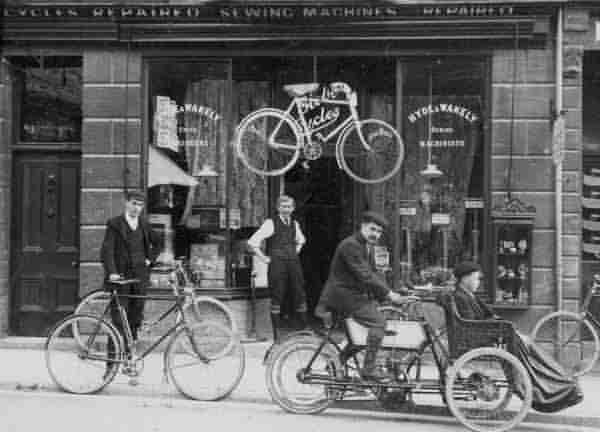
Courtesy of Nick
Hyde
Hyde & Wakely's premises at 17 Vicarage Street, probably photographed around 1905. Joseph Hyde stands in the doorway and Fred Wakely is driving the motorised cycle with attached passenger seat in front - how scary would it have been to be a passenger in that contraption?
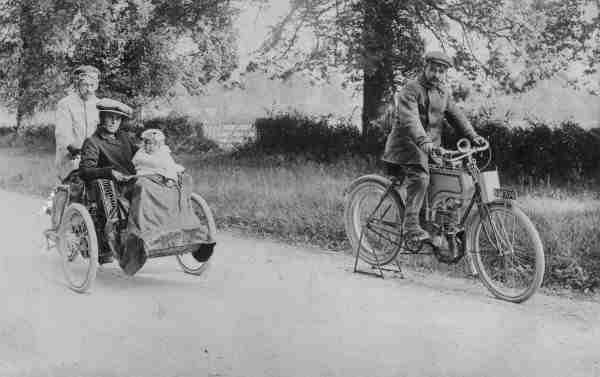
Courtesy of Nick
Hyde
Joseph and Emily Hyde, with baby Gladys, pose with Fred Wakely. Again photographed in 1905.
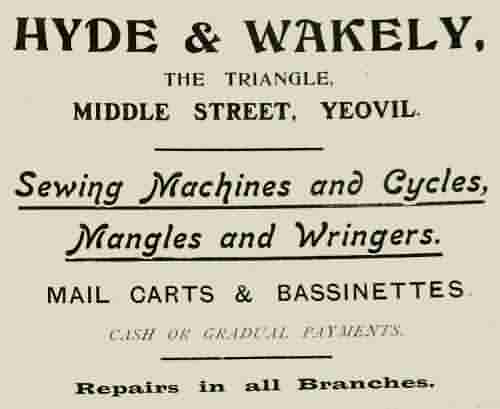
Hyde & Wakely's advertisement placed in the 1906 edition of the Homeland Handbook.
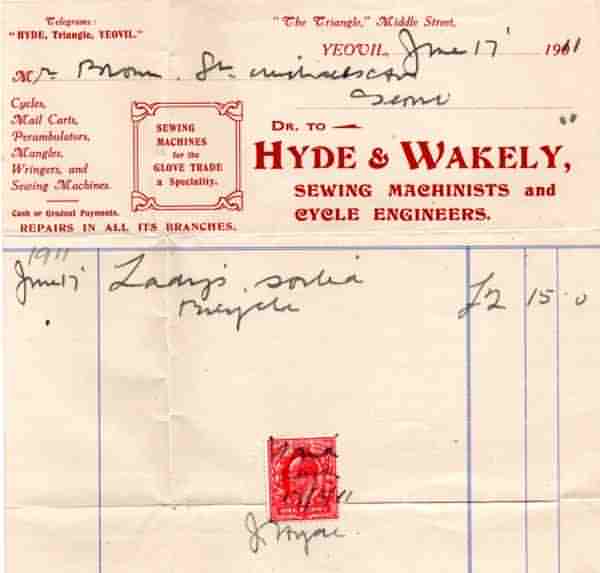
From my
collection
A Hyde & Wakely receipt dated 17 June 1911 for a bicycle - £2 15s 0d !!!
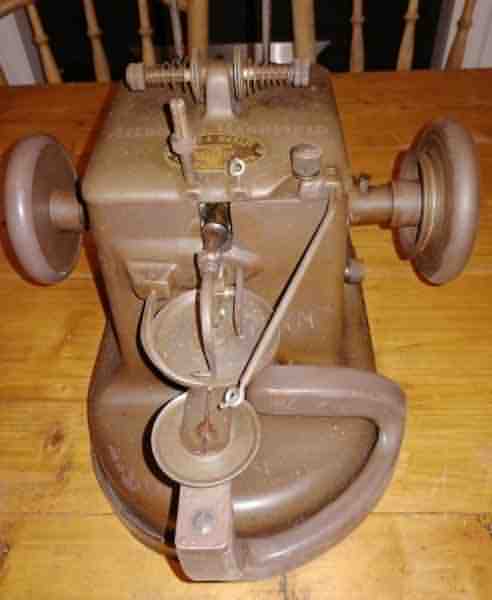
A 'Success' glove sewing machine, made by Allbrook & Hashfield of London and retailed by Hyde and Wakely. This example came from the Yeovil Glove Company of the Nautilus Works, Reckleford.
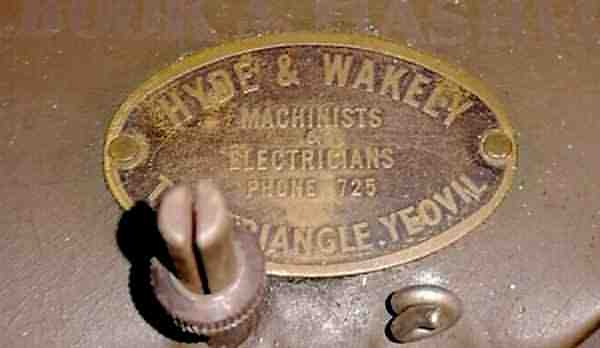
The Hyde & Wakely nameplate of the above glove sewing machine.
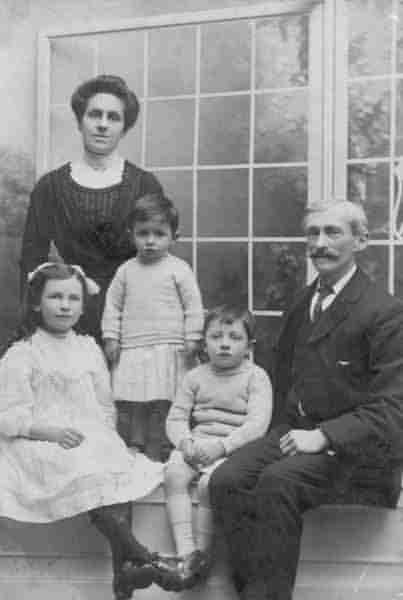
Courtesy of Nick
Hyde
Joseph and Emily Hyde with their three children, photographed around 1913.
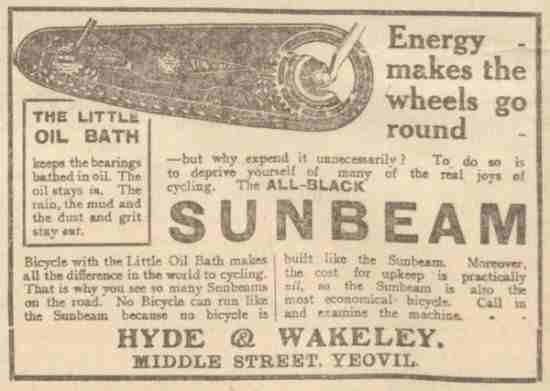
... and their advertisement placed in several 1923 editions of the Western Gazette.
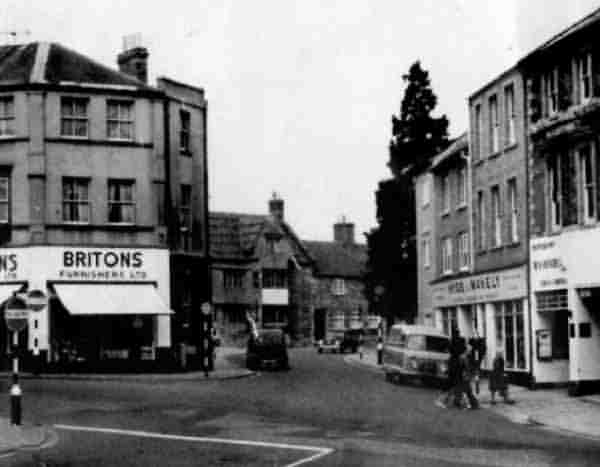
Hyde & Wakely's premises at right, behind the van. Photographed from the Triangle in the early 1960s.
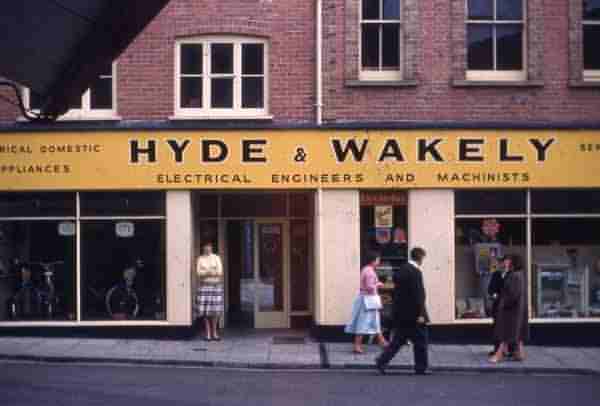
Courtesy of Nick
Hyde
Hyde & Wakely's premises photographed in 1961. Nick Hyde recalls "The lady stood in the doorway in this photo is Merrill Clark who worked in the office and had the disconcerting ability to go down through adding up a column of pounds, shillings and pence just once and write down the correct answer at the bottom!"
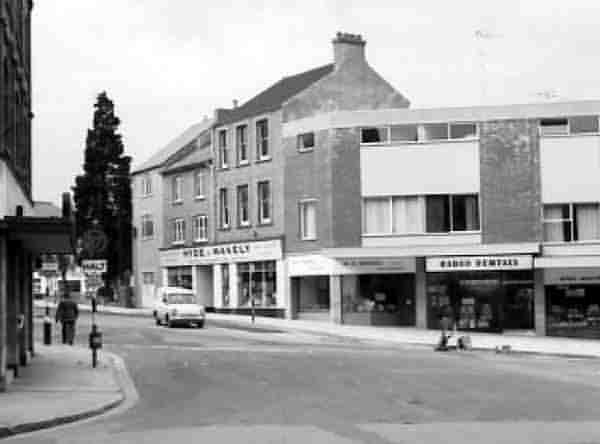
... and seen again in the later 1960s after the completion of the adjoining Glovers Walk project.
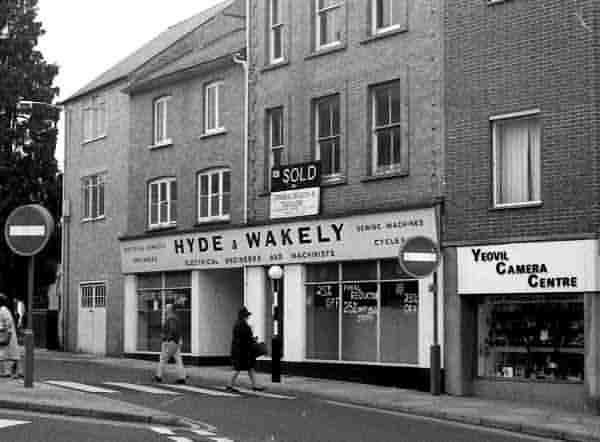
Courtesy of Nick
Hyde
Hyde & Wakely's premises, closed and sold, photographed in 1971.
Nick Hyde recalls "The narrow building at the left was part of Hyde & Wakely's premises. Behind those double wooden doors was an open loading bay area leading, on the ground floor, to a large workshop that was used for all cycle and small appliance repairs. It had a huge sliding wooden door with glass panes that opened up onto an outside yard at the back of the shop, with access to the quite ancient outside toilet in one corner. There was an open wooden staircase leading to the first floor, where the area overlooking Vicarage Street was storage, and my dad's workshop for sewing machine repairs ran the whole width of that section of building overlooking the aforementioned yard at the rear."
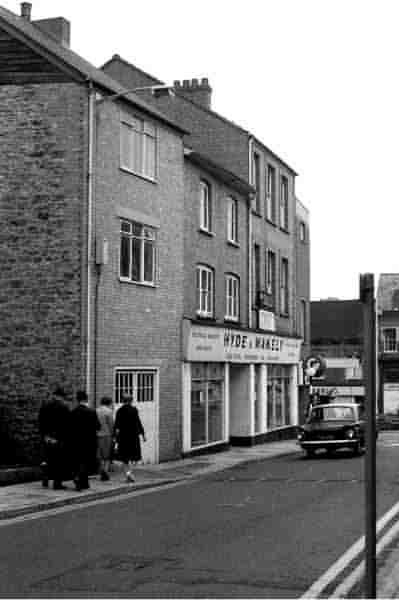
Courtesy of Nick
Hyde
Hyde & Wakely's premises, seen from Vicarage Street and looking to the Triangle, again photographed in 1971.
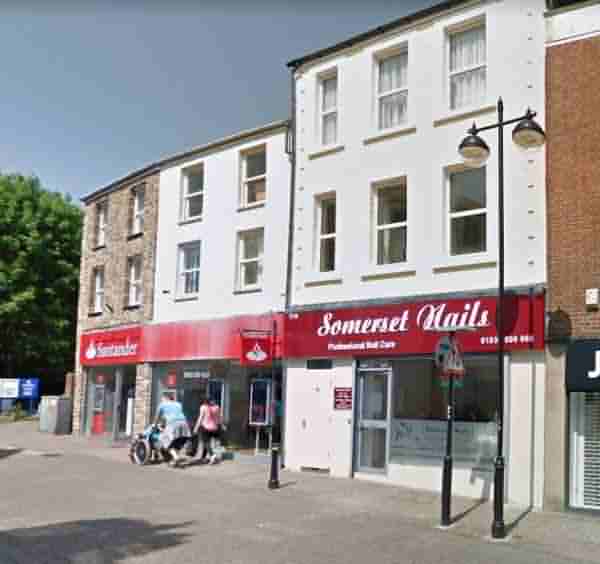
The former Hyde & Wakely premises today.
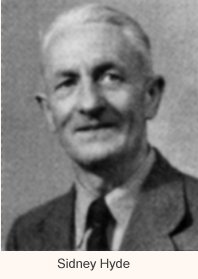 The
business
was
established
in 1900
by Mr
Sidney
Hyde's
father
in
partnership
with the
late Mr
FT
Wakely
and is
carried
on by
the two
sons (Mr
Wakely
Junior
looking
after
the
electrical
side).
To talk
to Mr
Hyde was
to get
an
intimate
glimpse
into the
lifetime
of a
business
and I
find
myself
quoting
him at
length.
The
business
was
established
in 1900
by Mr
Sidney
Hyde's
father
in
partnership
with the
late Mr
FT
Wakely
and is
carried
on by
the two
sons (Mr
Wakely
Junior
looking
after
the
electrical
side).
To talk
to Mr
Hyde was
to get
an
intimate
glimpse
into the
lifetime
of a
business
and I
find
myself
quoting
him at
length.